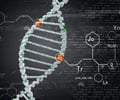US researchers said in a study published Monday that a chromosome abnormality called aneuploidy can cause cancer.
With virtually all human cancers having an abnormal number of chromosomes, scientists have "long suspected that gene mutations which promote erroneous chromosome separation during cell division are to blame for tumor development," researchers at the Mayo Clinic said in a statement."By using a combination of new and established mouse models for human cancer, we were able to prove that aneuploidy causes cancer and elucidate the mechanism by which it does so," said Mayo Clinic cancer biologist and senior author of the study, Jan van Deursen.
In tests on mice, the researchers found that a cell was less able to suppress tumors if there was incomplete mitosis - the term for the division of a chromosome - that resulting in misalignment or missegregation, when a cell is missing a chromosome.
"The cell loses the ability to suppress tumors, which is part of the immune system," said Mayo Clinic spokeswoman Bob Nellis.
"It's like losing the anti-viral software on your computer," Mayo Clinic spokesman Bob Nellis told AFP.
"The cell is pretty much saying 'Come and get me' to the cancer," he said.
Advertisement
Among cancers found in the study to be sparked by aneuploidy were cancer of the colon and cancer of the tissue of the lymphatic system.
Advertisement
"Now that we understand the mechanism by which aneuploidy causes cancer, it will be easier for other researchers to build on this knowledge, and target new drugs accordingly," said van Deursen in a statement.
In another study, published in the Journal of Cell Biology on Monday, researchers at the National Cancer Institute (NCI) "explored the possibility that disease-specific spatial organization of genes might be used as a new diagnostic strategy to distinguish malignant from normal tissue."
The researchers found several genes in invasive breast cancer tissue that had a different position inside the cell nucleus than they did in normal breast tissue.
They also found that the position of a single gene, HES5, allowed them to identify invasive breast cancer tissue "with nearly 100 percent accuracy".
The findings of that study open the possibility of using the position of a gene in the cell nucleus as a new diagnostic tool -- although the authors admit that a wider study has to be carried out first.
Their study looked at a set of 20 genes in cells in 11 normal human breast and 14 invasive breast cancer tissue specimens.
"If validated in a larger number of samples, we envision that this approach may be a useful first molecular indicator of cancer after an abnormal mammogram," said Tom Misteli of NCI's Center for Cancer Research, who was a senior author on the study.
Using a gene's position in the cell nucleus to detect tumors could "reduce human error in making a diagnosis because the method gives a quantifiable readout and is not based on subjective criteria or the individual expertise of the pathologist who performs an evaluation with a microscope," the study said.
The new diagnostic tool would not be limited to breast cancer, either, but could be applied to any cancer in which repositioned genes can be identified, Misteli said.
Source-AFP
RAS













